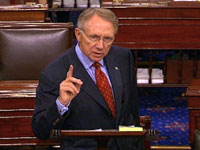Senate Health Bill's Cost at USD 849 Billion
Senate Majority Leader Harry Reid on Wednesday unveiled a sweeping health care bill that would expand health insurance coverage to 30 million more Americans at an estimated cost of $849 billion over 10 years.

Reid and other Senate Democrats cited an analysis by the nonpartisan Congressional Budget Office for the coverage and cost figures. The CBO estimates the proposal would reduce the federal deficit by $130 billion over the next 10 years, through 2019. Any effect on the deficit in the following decade would be "subject to substantial uncertainty," but probably would result in "small reductions in federal budget deficits," according to the CBO.
President Obama hailed what he called a "critical milestone" in the push to meet his top domestic priority for 2009.
"From day one, our goal has been to enact legislation that offers stability and security to those who have insurance and affordable coverage to those who don't, and that lowers costs for families, businesses and governments across the country," Obama said in a statement, adding that the Senate proposal "meets those principles," reports CNN.
Senators emerging from their closed-door meeting with Reid provided further details of the bill.
Sen. John Kerry (D., Mass.) said all consumers who purchase insurance from private companies in the exchange would have access to abortion coverage.
He said plans without abortion coverage also would have to be sold, giving consumers a choice. That is less restrictive than a provision in the House-passed bill that has angered liberals and abortion-rights supporters.
In a sign of the challenge confronting Reid, the Nevada Democrat met earlier in the day with Sens. Ben Nelson of Nebraska, Mary Landrieu of Louisiana, and Blanche Lincoln of Arkansas, moderates within his party who have expressed reservations about the bill.
"He is walking through the particulars with them," said Reid's spokesman, Jim Manley. "We need 60 votes to get this bill to the floor."
Nelson later issued a statement strongly suggesting he would vote with fellow Democrats on an initial showdown expected within days. Landrieu said, "I'm not going to be for anything that doesn't drive down costs over time."
Lincoln, the only one of the three who faces reelection next year, told reporters, "We'll wait and see."
With the support of two independents, Democrats have 60 seats, the precise number needed to choke off any Republican delaying tactics. None of the 40 Republicans is expected to defect on the first test vote, which may come as early as Saturday, Philadelphia Inquirer reports.
Subscribe to Pravda.Ru Telegram channel, Facebook, RSS!


